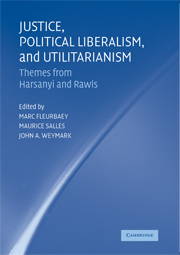Book contents
- Frontmatter
- Contents
- Preface
- List of Contributors
- 1 An Introduction to Justice, Political Liberalism, and Utilitarianism
- PART ONE THEMES FROM RAWLS
- PART TWO HARSANYI'S IMPARTIAL OBSERVER AND SOCIAL AGGREGATION THEOREMS
- PART THREE GOODNESS AND WELL-BEING
- PART FOUR SHARING THE GAINS FROM SOCIAL COOPERATION
- 13 Naturalizing Harsanyi and Rawls
- 14 The Social Contract Naturalized
- 15 An Alternative Model of Rational Cooperation
- PART FIVE RIGHTS AND LIBERTIES
- Index
14 - The Social Contract Naturalized
Published online by Cambridge University Press: 09 February 2010
- Frontmatter
- Contents
- Preface
- List of Contributors
- 1 An Introduction to Justice, Political Liberalism, and Utilitarianism
- PART ONE THEMES FROM RAWLS
- PART TWO HARSANYI'S IMPARTIAL OBSERVER AND SOCIAL AGGREGATION THEOREMS
- PART THREE GOODNESS AND WELL-BEING
- PART FOUR SHARING THE GAINS FROM SOCIAL COOPERATION
- 13 Naturalizing Harsanyi and Rawls
- 14 The Social Contract Naturalized
- 15 An Alternative Model of Rational Cooperation
- PART FIVE RIGHTS AND LIBERTIES
- Index
Summary
Introduction
For John Harsanyi and John Rawls – as well as for Thomas Hobbes before them – the theory of the social contract is an application of the theory of rational decision. For Harsanyi and Rawls, it does not matter whether people are rational or whether there ever was or could have been a state of nature of the kind considered. The importance of the concepts rationality and the state of nature is not descriptive, but rather lies in the role that they play in a counterfactual definition of justice. A just arrangement is one to which rational decision makers would agree in the state of nature.
Justice is customarily depicted with a blindfold, a scale, and a sword. Both Harsanyi and Rawls structure the state of nature as the blindfold. Justice is rational decision behind the “veil of ignorance.” This is a departure from Hobbes. Rawls sees it as a Kantian approach, but justice had her blindfold long before Immanuel Kant formulated his categorical imperative.
There is a different tradition exemplified by David Hume. For Hume, the social contract is a tissue of conventions that have grown up over time. I cannot resist reproducing in full this marvelously insightful passage from his Treatise:
Two men who pull on the oars of a boat do it by an agreement or convention, tho' they have never given promises to each other. Nor is the rule concerning the stability of possession the less derive'd from human conventions, that it arises gradually, and acquires force by a slow progression, and by our repeated experience of the inconveniences of transgressing it. […]
- Type
- Chapter
- Information
- Justice, Political Liberalism, and UtilitarianismThemes from Harsanyi and Rawls, pp. 334 - 350Publisher: Cambridge University PressPrint publication year: 2008



